

History of the world. World population[1] from 10,000 BCE to 2,000 CE.
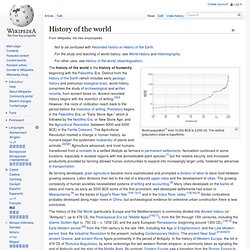
The vertical (population) scale is logarithmic. The history of the world is the history of humanity, beginning with the Paleolithic Era. Crusades. The Crusades were military campaigns sanctioned by the Latin Roman Catholic Church during the High Middle Ages through to the end of the Late Middle Ages.
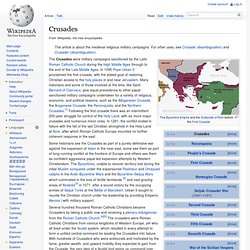
In 1095 Pope Urban II proclaimed the first crusade, with the stated goal of restoring Christian access to the holy places in and near Jerusalem. Many historians and some of those involved at the time, like Saint Bernard of Clairvaux, give equal precedence to other papal-sanctioned military campaigns undertaken for a variety of religious, economic, and political reasons, such as the Albigensian Crusade, the Aragonese Crusade, the Reconquista, and the Northern Crusades.[1] Following the first crusade there was an intermittent 200-year struggle for control of the Holy Land, with six more major crusades and numerous minor ones.
Frederick I, Holy Roman Emperor. What did the Knights Templar Do. The Knights Templar were created by the pope to escort and protect "tourists" going to the Holy Land, and to fight Muslims there.
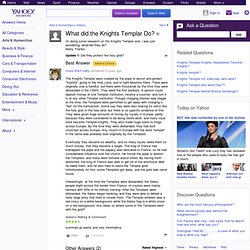
There were originally only a handful, but there were thousands by the time they were disbanded in the 1300's. They were the first bankers. A person could deposit money at one Templar institution, receive a voucher, and turn it in at any other Templar institution. Though charging interest was illiegal at the time, the Templars were permitted to get away with charging a "fee" for the transaction.
Some say they were also looking for relics like the holy grail in the holy land, but there is no specific evidence of this. Eventually they became so wealthy, and so many royals owed them so much money, that they became a target. Dark Ages (historiography) The Dark Ages is a historical periodization used originally for the Middle Ages, which emphasizes the cultural and economic deterioration that supposedly occurred in Western Europe following the decline of the Roman Empire.[1][2] The label employs traditional light-versus-darkness imagery to contrast the "darkness" of the period with earlier and later periods of "light".[3] The period is characterized by a relative scarcity of historical and other written records at least for some areas of Europe, rendering it obscure to historians.
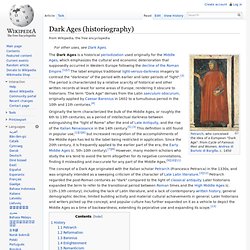
Middle Ages. In European history, the Middle Ages, or Medieval period, lasted from the 5th to the 15th century.
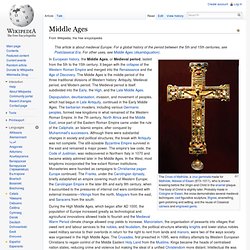
It began with the collapse of the Western Roman Empire and merged into the Renaissance and the Age of Discovery. Renaissance. The Renaissance (UK /rɨˈneɪsəns/, US /ˈrɛnɨsɑːns/, French pronunciation: [ʁənɛsɑ̃s], from French: Renaissance "re-birth", Italian: Rinascimento, from rinascere "to be reborn")[1] was a cultural movement that spanned the period roughly from the 14th to the 17th century, beginning in Italy in the Late Middle Ages and later spreading to the rest of Europe.

Though availability of paper and the invention of metal movable type sped the dissemination of ideas from the later 15th century, the changes of the Renaissance were not uniformly experienced across Europe. In politics, the Renaissance contributed the development of the conventions of diplomacy, and in science an increased reliance on observation. Historians often argue this intellectual transformation was a bridge between the Middle Ages and Modern history. Overview[edit] The Renaissance was a cultural movement that profoundly affected European intellectual life in the early modern period. Origins[edit] Black Death/Plague[edit]
Age of Enlightenment. The Age of Enlightenment (or simply the Enlightenment, or Age of Reason) is an era from the 1650s to the 1780s in which cultural and intellectual forces in Western Europe emphasized reason, analysis and individualism rather than traditional lines of authority.
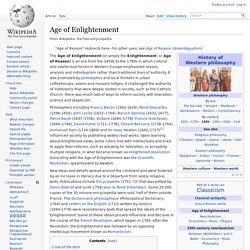
It was promoted by philosophes and local thinkers in urban coffeehouses, salons and masonic lodges. It challenged the authority of institutions that were deeply rooted in society, such as the Catholic Church; there was much talk of ways to reform society with toleration, science and skepticism. New ideas and beliefs spread around the continent and were fostered by an increase in literacy due to a departure from solely religious texts. Publications include Encyclopédie (1751–72) that was edited by Denis Diderot and (until 1759) Jean le Rond d'Alembert.